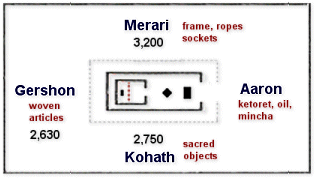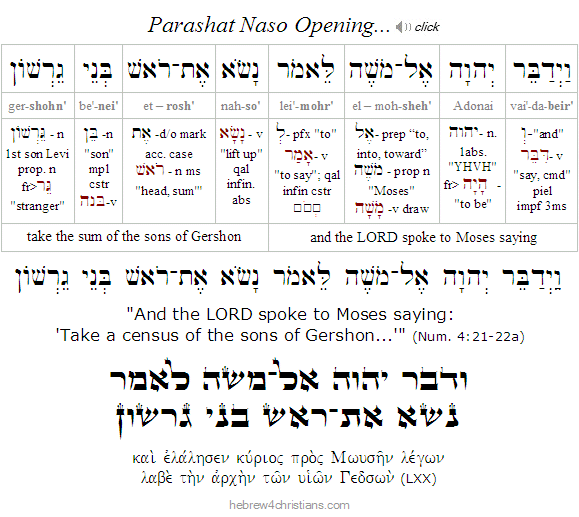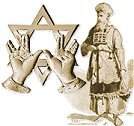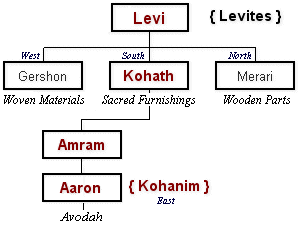|
|
 |
 |
 |
 |
|
Weekly Torah Reading
|
|
|
|
Parashat Naso ("Lift up!")
|
|
|
Click on the links to display the Scriptures:
|
|
|
|
 |
 |
 |
|
Torah Reading Overview
|
|
|
|
In Parashat Bamidbar, a census was taken of all Levite males from the age of one month and up (totaling 23,000). In Parashat Naso, an additional census is taken of the three Levite clans that were responsible for transporting the mishkan (tabernacle) in the wilderness.
The parashah begins:
|
|
|
 |
 |
|
And the LORD spoke to Moses, saying, take a census of the sons of Gershon also,
by their fathers' houses and by their clans. (Numbers 4:21-22)
|
 |
 |
 |
|
The Roles of the Levites
|
|
|
|
As you studied in parashat Bamidbar, the firstborn son of each Jewish family was originally intended to perform avodah (service to the LORD) by offering sacrifices on behalf of their family (Exod. 13:2). However, when the firstborn sons of Israel later took part in the Sin of the Golden Calf, they sadly forfeited this right. The LORD commanded Moses to exchange the roles of the firstborn son to the Levites, who would then serve Him in the mishkan.
The descendants of Levi were themselves stratified according to their lineage, so that there are four divisions of Levites:
|
 |
 |
|
- The Gershonites - Descendants of Levi's firstborn son Gershon (Ger-shon). This clan was responsible for caring for the mishkan's woven articles (i.e., the coverings for the walls and roof of the tabernacle). They dwelt on the West side of the mishkan. Aaron's son Isamar was the overseer of the Gershonites.
- The Kohathites - Descendants of Levi's middle son Kohath (Kehat). This clan carried the sacred objects of the mishkan (midrash states that the holy ark actually carried those who carried it). Note that the kohanim are a subset of this clan (see below). They dwelt on the South side of the mishkan.
- The Merarites - Descendants of Levi's youngest son Merari. This clan carried the wooden parts of the mishkan as well as the ropes and sockets used for the curtain of the courtyard. They dwelt on the North side of the mishkan. Aaron's son Isamar was the overseer of the Merarites.
- The Kohanim - Descendants of Levi's great grandson Aaron. This clan was responsible for performing all of the korbonot (sacrifices) and other rituals on behalf of all of Israel. As the priestly class of Israel, only the Kohanim were allowed to perform avodah (priestly service). They dwelt on the East side of the mishkan.
|
|
|
 |
 |
|
In addition to carrying the various ritual objects, the Leviim (Levites) assisted the Kohanim by slaughtering animal sacrifices, cleaning them and cutting them up. Some of the Levites were selected to guard the mishkan, while others were designated as singers and musicians in the Camp of the Shechinah (music accompanied the various tamid (daily) sacrifices).
|
|
 |
 |
|
Earlier the LORD commanded that a separate census of all the clans of Levi be taken, but now He wanted a separate count of the Kohathites, the Gershonites, and the Merarites, (but this time from the ages of 30-50 years old). The results of this additional census were: Kehat = 2,750; Gershon = 2,630; Merari = 3,200, indicating a total work force of 8,580 between the ages of 30 and 50.
|
 |
 |
|
Making the Camp Holy
|
 |
 |
 |
 |
 |
 |
 |
 |
 |
 |
 |
 |
 |
|
After taking the census and setting up the clans around the Mishkan, the LORD commanded that all the ritually unclean (tamei) were to be sent out of all three camps (the camp of the Shechinah (i.e., the mishkan), the camp of the Levites, and the camp of the Israelites in general). All those afflicted by tzara'at (a skin affliction resulting from lashon hara), or had a discharge were to be excluded from the sacred assembly in the wilderness (those who were made unclean by contact with the dead were only forbidden to enter the camp of the mishkan but could remain in the other camps).
|
|
|
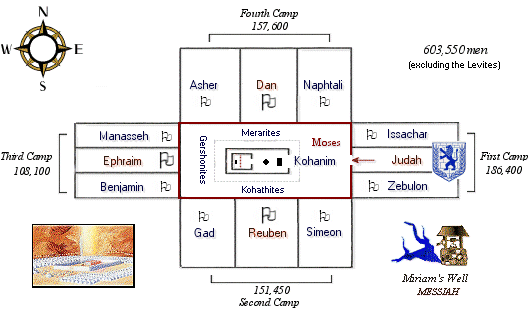 |
|
|
|
Viduy and Restitution
|
|
|
Next the LORD commanded Moses to tell the Israelites that if anyone commits a sin, he or she must confess it and make full restitution (teshuvah) for the wrong, adding 20% to the damages done to the offended party. Although this seems to concern the sin of theft, upon reflection it is understood that all sin is a sort of theft, since life was given to us to do God's will, and transgression of that will robs God of the glory due His Name.
In addition, terumot (contributions) to the priests are mandatory, and those who withhold the ma'aser (percentage) are subject to judgment from the LORD. There is a strange statement in 5:10: "A man's holies shall be his..." Paradoxically, the offering one gives away to holy causes is permanently held, whereas the offering of one's personal assets is temporary. The giving of tzedakah delivers the soul from trouble (Prov. 28:27).
|
|
|
|
The Law of the Sotah
|
|
|
Jewish midrash says that when Israel was in Egypt, the Jewish women all remained faithful to their husbands and refrained from both intermarriage and especially from illicit unions (i.e., adultery and fornication) with Egyptian men. According to the Talmud, it was on account of their zechut (merit) that God delivered Israel from bondage and sent the 10 plagues upon the Egyptians during the great Exodus.
Despite this great merit, however, the Torah provided a means of testing a woman's fidelity to her husband in cases where there was reasonable doubt. This is called the law of the "Sotah," or the wife suspected of unfaithfulness by her husband (Num. 5:12-31).
In an unusual ritual, a husband would bring his wife to the kohanim and present a "jealousy" offering (actually, an offering of barley rather than wheat, without added oil and spices as was customary for the minchah offering). A kohen would then take the offering and put it in the woman's hand and the woman was required to make an oath of her innocence before the LORD.
After this, the kohen would prepare "bitter water" that the woman would be required to drink. The priest would take an earthen drinking vessel and fill it with water taken from the Kiyyor Nechoshet (bronze laver or wash basin), mixing some dust from the mishkan floor and stirring it into the water. The priest would write on a scroll a curse that described the woman's punishment, written with the sacred Name of God, and immerse it in the water so that the words of the oath "rubbed off" (dissolved) into the water of the drinking vessel.
Finally she was made to drink "bitter waters." If she was indeed guilty of adultery, she would die a painful death: her body would swell, her face would become ashen, and her limbs would weaken. If she was vindicated, however, the water would not harm her at all, and she would be given a special blessing that she would no longer have pain during childbirth. Note that the Talmud (Sotah 27b) states that though it is the woman who was made to drink the bitter waters, the death sentence was also given to her male partner in adultery.
|
|
|
|
The Law of the Nazir
|
|
|
Next is given the law of the "Nazir" (Nazirite), or one takes a vow of consecration for a specific period of time in dedication to the LORD (i.e., the Jewish ascetic). The word nazir means "consecrated" or "separated." To become a Nazirite (no relation to Nazarene), a person (male or female) must take a vow of nezirut (Nazirite vow). This involved refraining from three things:
- Wine or any kind products of the grape vine (e.g., grapes, raisins, wine vinegar). Apparently there is no prohibition for the nazirite to drink alcoholic beverages not derived from grapes, for example, fermented apple cider, though the prohibition against "strong drink" (shekhar) is clearly stated.
- Cutting the hair (for a specific period of time)
- Contact with a corpse (including one's own family members)
Note that if any of these conditions are not kept while under the vow, the nazir must begin his or her time of consecration all over again. For example, if a nazir accidentally becomes tamei during a 30 day nezirut, he must wait the seven required days to become tahor (pure) again, offer korbonot on the eighth day, and begin the 30 day vow all over again, from the beginning.
After the period of the vow ended, the Nazirite would shave his head and burn his or her hair on the fire of one of the korbonot (a special room in the Temple (called lishkat nezirim) was devoted to the shaving of nazir). A number of additional offerings, including a chatat (sin) offering, was then given to the LORD (Numbers 6:10-21).
While most Nazirite vows were temporary (usually 30 to 100 days), some were Nazirites from birth to death (e.g., Samson (Judges 13:7) and John the Baptist (Luke 1:15-17)). Interestingly, the Apostle Paul himself also took a Nazirite vow (Acts 18:18, 21:22-26), thus demonstrating his allegiance to Torah observance as a follower of Jesus.
|
|
|
|
Birkat Kohanim
|
|
|
In the midst of this reading, the LORD gives commandment for Aaron and his clan to bless the people of Israel (Num. 6:23-27), called the priestly blessing (birkat kohanim). This blessing was intended to "put the Name of the LORD upon the people of Israel." (To hear it recited, click here.) Traditionally, the priests blessed the people every morning after the sacrifice at the mishkan (and later at the Temple). Today, Sephardic synagogues end their service with this blessing as a benediction (Ashkenaz only recite it on Pesach, Shavuot, Rosh Hashanah, Yom Kippur, and Sukkot).
According to midrash (and Jewish tradition), in the beginning only God could bless other people. His first blessing was to Adam and Eve ("Be fruitful..."). Later He blessed Noah and his sons when they left the teivah (ark). God especially blessed Abraham the tzaddik, who was given the power of blessing others (Gen. 12:3 - "Who you bless, I will bless"). Abraham did not directly bless Isaac, however, since he did not want to also bless Ishmael, so God stepped in and blessed Isaac directly (Gen. 25:11). The power of blessing others was then transferred to Isaac, who then transferred it to Jacob (Gen. 27:30), who blessed his twelve sons before he died (Gen. 48-49). In the Torah, God told Moses that the power to bless others would now come from His appointed kohanim.
t is customary in modern sysnagogue services that when the cantor (or prayer leader) is finishing the modim (thanksgiving) blessing ("Our God and God of our fathers, bless us with the threefold [priestly] blessing…") and reaches the word "kohanim," the Kohanim present are summoned to recite this blessing upon the assembled minyan (representing Israel). The congregation responds by saying, "am kedoshekha ka'amur."
The blessing recited before birkat kohanim is le'varekh et amno Yisrael be'ahavah ("to bless His nation Israel with love"). The phrase "with love" is integral and is intended to represent the love of the LORD for His people. Just as God blesses us as an expression of His kindness, so to the kohen must seek to display God's love in this manner.
All mitzvot should be performed joyfully, though if someone cannot attain this emotion, the mitzvah must still be performed. The mitzvah of birkat kohanim is unique in that if a kohen is unhappy, he must not recite the blessing (therefore a kohen who is in aveilut (mourning over the death of a parent) is required to leave during birkat kohanim).
When recited, the kohen (priest) raises his hands with the palms facing outward and the thumbs of his outspread hands touching. The four fingers on each hand are split into two sets of two fingers each (thus forming the letter Shin, an emblem for Shaddai):
יברכך יהוה וישמרך
יאר יהוה פניו אליך ויחנך
ישא יהוה פניו אליך וישם לך שׁלום
ye·vah·re'·khe·kha' · Adonai · ve·yeesh'·me·re'·kha
yah·eir · Adonai · pah·nav · e·ley'·kha · vee·khoon·ne'·kah
yees·sa · Adonai · pah·nav · e·ley'·kha · ve·yah·seim · le·kha · shah·lohm

"The LORD bless you and keep you;
The LORD shine his face upon you and be gracious to you;
The LORD lift up his face upon you and give you his peace."
(Num. 6:24-26)

Nesiat Kapayim (Raising of the hands)
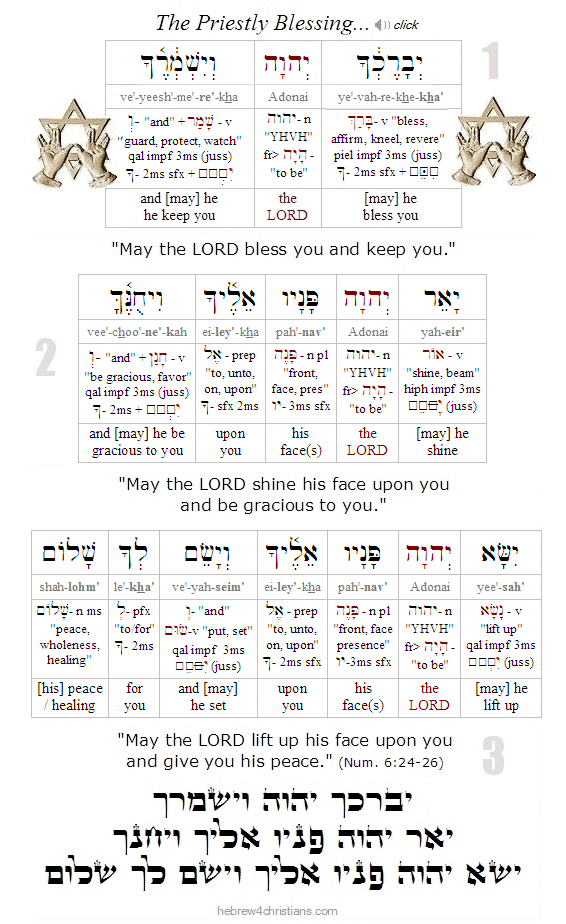 |
Note: The verbs in this blessing are all "jussive," usually expressing wish, desire, or command, though understood in context (i.e., as part of the blessing recited by the kohanim during ceremonial occasions), the verbs should be regarded as declarative or oracular. The idea of God "lifting up his face" is an idiomatic expression meaning that he gazes upon you in peace and blessing... To learn more about this blessing, click here.
The Three-in-One Blessing...
Notice that the Hebrew text of the blessing begins with three words, is comprised of three parts, invokes the divine Name three times, and is therefore appropriately called "the three-in-one blessing" (שלוש בברכה אחת). Notice also that the words are spoken in the grammatical singular rather than plural because they are meant to have personal application, not to be a general benediction over a crowd of people. The phrase, "the LORD lift up his face upon you..." (ישא יהוה פניו אליך) pictures the beaming face of a parent lifting up his beloved child in joy... The repetitive construction of God "lifting up His face" (יהוה פניו אליך) indicates that he gazes upon you in love and blessing. Undoubtedly our LORD Yeshua recited this very blessing over his disciples when he ascended back to heaven, though He would have spoken it in the grammatical first person: "I bless you and keep you (אני אברך אותך ואשמור לך); I shine upon you and am full of grace toward you; I lift up my face toward you and give you my shalom" (see Luke 24:50-51).
|
|
|
|
The Donations of the Nesi'im
|
|
|
The parashah now resumes the account (from Parashat Shemini) of the seven days of ordination (yemei ha-milu'im) of the mishkan (tabernacle). The leaders (nesi'im) of the twelve tribes donated six wagons and 12 oxen to carry the boards, curtains, and other objects of the mishkan (the sacred objects of the mishkan were still required to be carried on the shoulders of the Kohathites). In addition, each of the tribal leaders brought offerings for the inauguration of the mizbe'ach (altar). Even though their gifts were identical, each was brought on a different day as described in the Torah.
The parashah ends with the camp set up, the tabernacle furnished and supplied, and Moses in the Mishkan listening to the voice of the LORD "speaking to him from above the mercy seat that was on the ark of the testimony, from between the two cherubim."
|
|
|
|
 |
|
|
|
Haftarah Reading Overview
|
|
|
|
The Haftarah for Naso recounts the miraculous birth of Shimshon (Samson), who was to commanded by the Angel of LORD (who was in fact God Himself) to be a Nazirite from birth. Samson was given a commission to be one of the great deliverer's of Israel.
Samson's nezirut was different in some ways than that described in Naso. For one thing, in the Torah portion, the vow was voluntary, whereas in the case of Samson, the LORD Himself commanded it. Second, the typical nezirut lasted 30 days, but Samson's began at conception (Menoach's wife was given her own nezirut to perform at conception) and was to last his entire lifetime. Finally, the restriction of the Nazir to not touch a corpse could not have been in place for Samson, since he was known for his military exploits (e.g., killing 1,000 Philistines with the jawbone of a donkey).
Samson's gift from the LORD remained as long as he was faithful to the vow of Nezirut, but he was eventually undone by the wiles of the temptress Delilah, who beguiled him to break his vow before the LORD.
|
|
|
|
 |
|
|
|
Brit Chadashah Overview
|
|
|
|
The Brit Chadashah reading shows the Apostle Paul arriving in Jerusalem to visit James, the half-brother of the LORD Yeshua, and leader of the church that Jesus Himself started. James and the elders listened as Paul told them about his missionary activity among the Gentiles, but they felt compelled to have Paul join four others in a Nazirite vow and to pay for their expenses (i.e., the sacrifices commanded in the Torah). By so doing, Paul would demonstrate to the Jews that he was indeed Torah observant and not teaching anything contrary to the law of Moses.
As for the Gentiles who had believed, James and the elders reaffirmed their previous instruction that they (minimally) abide by the Noahide laws (Acts 15:19-29) in order to be members of the Jesus movement - that is, without becoming full Jews (i.e., undergoing ritual circumcision and becoming obligated to keep the mitzvot of the Torah).
As is evident from this passage, as well as others in the book of Acts, Paul continued to be Torah observant throughout his life, even after his conversion to Christianity. In fact, Paul took another Nazirite vow after these events, as revealed in Acts 18:18.
Blessing:
|
|
 |
|
|
 |
|
|
 |
 |
|
For Further Study:
|
|
|



